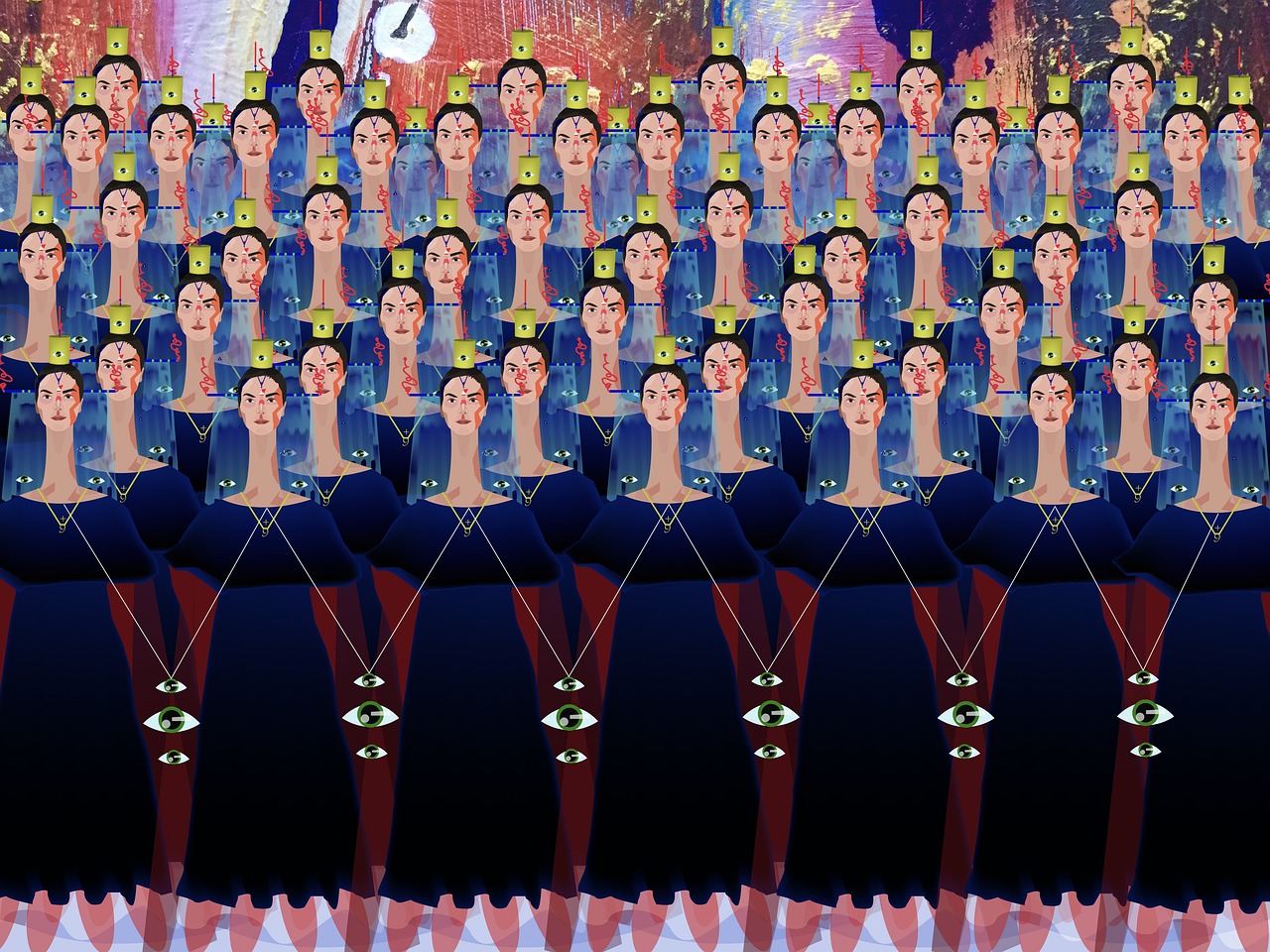Metaphysics: Can it Decipher the Quantum Enigma?
Have you ever wondered if the universe is just a grand illusion, a complex tapestry woven from threads of consciousness and reality? The intersection of metaphysics and quantum physics invites us to explore these profound questions, challenging our traditional understanding of existence. As we delve into this enigmatic realm, we find ourselves at the crossroads of science and philosophy, where the mysteries of quantum mechanics intertwine with the abstract concepts of metaphysical thought.
At its core, metaphysics seeks to answer the fundamental questions of existence: What is reality? What does it mean to exist? These inquiries are not just academic; they resonate deeply with our everyday experiences and perceptions. When we look at the world through the lens of quantum mechanics, we encounter a reality that defies our classical intuitions. The behavior of particles at the quantum level seems to suggest that reality is not as straightforward as we once believed. Instead, it appears to be a fluid, dynamic construct shaped by observation and consciousness.
Imagine standing at the edge of a vast ocean, where waves crash and recede, revealing hidden depths beneath the surface. This ocean symbolizes the complexities of quantum mechanics, while the waves represent our understanding of reality. Just as the ocean is ever-changing, so too is our grasp of the quantum world. As we dive deeper, we uncover astonishing phenomena that challenge our perceptions and compel us to reconsider what we know about existence itself.
In this article, we will embark on a journey through the intriguing landscape of quantum mechanics and metaphysics. We'll explore key principles such as wave-particle duality, the observer effect, and entanglement, each of which raises profound questions about the nature of reality. Furthermore, we will examine various metaphysical interpretations of quantum theory, including the Copenhagen interpretation and the Many-Worlds interpretation, shedding light on their implications for our understanding of existence.
As we navigate this complex terrain, it becomes evident that metaphysics has the potential to bridge the gap between scientific inquiry and philosophical thought. By embracing the insights offered by both realms, we can foster a deeper understanding of the universe and our place within it. So, can metaphysics truly decipher the quantum enigma? Join us as we explore this fascinating intersection of ideas and seek answers to the questions that have captivated thinkers for centuries.
- What is the relationship between metaphysics and quantum physics?
Metaphysics explores the fundamental nature of reality, while quantum physics investigates the behavior of particles at the smallest scales. Together, they provide insights into existence and the fabric of the universe. - How does wave-particle duality challenge our understanding of reality?
This principle suggests that particles can exhibit both wave-like and particle-like properties, leading to questions about the nature of existence and observation. - What is the observer effect in quantum mechanics?
The observer effect highlights that the act of measurement can influence the state of a quantum system, prompting inquiries into the role of consciousness in shaping reality. - What are the implications of the Many-Worlds interpretation?
This interpretation posits that every quantum event results in multiple, branching realities, raising profound questions about identity and choice.

The Nature of Reality
When we dive into the depths of metaphysics, we find ourselves grappling with some of the most profound questions about existence and the universe. What does it mean for something to be real? Is reality merely a construct of our perceptions, or is there an objective world that exists independently of our thoughts? These questions become even more tantalizing when we consider the strange phenomena of quantum mechanics. It’s as if we’re trying to solve a cosmic puzzle where the pieces keep shifting, challenging our traditional notions of reality.
Metaphysical perspectives often shape our understanding of reality in ways that classical physics simply cannot explain. For instance, imagine reality as a vast tapestry, woven together with threads of existence, consciousness, and perception. Each thread represents a different aspect of our understanding, and when we pull on one, the entire fabric shifts. This interplay between metaphysics and quantum physics raises fascinating questions about the nature of existence itself.
One of the key metaphysical inquiries is whether reality is absolute or relative. In classical physics, we often assume a fixed reality governed by universal laws. However, quantum mechanics introduces a level of unpredictability and uncertainty that challenges this notion. For example, consider the concept of wave-particle duality. In the quantum realm, particles can exist in multiple states at once until they are observed, suggesting that reality may not be as solid as we once thought. This leads us to ponder: is reality a mere illusion, shaped by our observations and consciousness?
Moreover, the implications of quantum phenomena extend beyond mere scientific curiosity; they beckon us to reconsider our philosophical foundations. If reality can change based on observation, what does that say about our role in the universe? Are we mere spectators, or do we actively participate in shaping our reality? This question echoes throughout metaphysical discourse, inviting us to explore the interconnectedness of all things.
Let’s also not forget the role of consciousness in this grand tapestry. Some metaphysical theories propose that consciousness itself is a fundamental aspect of reality, a lens through which we perceive the universe. This idea raises the possibility that our thoughts, emotions, and intentions could influence the very fabric of reality. It’s a concept that feels both exhilarating and daunting—if our minds can shape reality, then we hold a tremendous responsibility in how we engage with the world around us.
In summary, the nature of reality is a complex interplay of metaphysical inquiry and quantum phenomena. As we continue to explore these realms, we may find that the answers we seek are not just scientific, but also deeply philosophical. The questions we ask today will shape our understanding of existence tomorrow, leading us to a more profound appreciation of the universe and our place within it.

Quantum Mechanics Explained
Quantum mechanics is often regarded as one of the most perplexing yet fascinating branches of physics. It's like stepping into a world where the rules we thought we understood no longer apply. Imagine a game where the players can be in two places at once or where the very act of watching changes the outcome. This is the essence of quantum mechanics—a realm where particles behave in ways that defy our classical intuitions. At its core, quantum mechanics seeks to describe the behavior of the smallest building blocks of the universe, such as atoms and subatomic particles.
To grasp the significance of quantum mechanics, it's essential to familiarize ourselves with some of its key principles. These principles challenge our traditional notions of reality and force us to reconsider the very fabric of existence. Here are a few foundational concepts:
- Wave-Particle Duality: Particles, such as electrons, can exhibit properties of both particles and waves, depending on how they are observed.
- Uncertainty Principle: Proposed by Werner Heisenberg, this principle states that certain pairs of properties, like position and momentum, cannot be simultaneously known with arbitrary precision.
- Superposition: Quantum systems can exist in multiple states at once until they are measured, at which point they collapse into one of the possible states.
These principles not only challenge our classical understanding but also open the door to a myriad of philosophical questions. For instance, if particles can exist in multiple states simultaneously, what does that say about the nature of reality? Are we merely observers in a universe that behaves according to its own rules, or do we play a role in shaping that reality?
As we delve deeper into quantum mechanics, we encounter concepts like the observer effect, which posits that the act of measurement can influence the state of a quantum system. This leads to profound implications for our understanding of consciousness and reality. Are we simply passive observers, or does our awareness actively participate in the unfolding of the universe's narrative?
Moreover, the phenomenon of entanglement reveals an even more astonishing aspect of quantum mechanics. When particles become entangled, the state of one particle is instantly correlated with the state of another, regardless of the distance separating them. This non-locality challenges our conventional understanding of space and time, suggesting that the universe is far more interconnected than we might have ever imagined.
In summary, quantum mechanics is not just a set of abstract theories; it is a gateway to understanding the universe at its most fundamental level. By exploring these principles, we can begin to appreciate the complexities of reality and the philosophical questions they raise about existence, observation, and the interconnectedness of all things. As we navigate through this quantum landscape, we find ourselves at the intersection of science and philosophy, where the mysteries of the universe beckon us to question everything we thought we knew.
- What is quantum mechanics? Quantum mechanics is a branch of physics that studies the behavior of matter and energy at the smallest scales, such as atoms and subatomic particles.
- How does wave-particle duality work? Wave-particle duality refers to the phenomenon where particles, like electrons, exhibit both wave-like and particle-like properties depending on the experimental setup.
- What is the observer effect? The observer effect describes how the act of measuring a quantum system can influence its state, leading to different outcomes based on whether or not it is observed.
- What is entanglement? Entanglement is a quantum phenomenon where two or more particles become interconnected, such that the state of one particle instantly influences the state of another, no matter the distance between them.

Wave-Particle Duality
Wave-particle duality is one of those mind-bending concepts in quantum mechanics that feels like it’s pulled straight from the pages of a science fiction novel. Imagine, if you will, a world where particles, the very building blocks of our universe, can behave both like tiny, discrete particles and like expansive waves. This duality challenges our everyday understanding of reality and forces us to reconsider what we think we know about existence. It's as if the universe is playing a cosmic game of hide and seek, revealing different aspects of itself depending on how we choose to observe it.
To grasp this concept, let’s take a closer look at some key experiments that illustrate wave-particle duality. The most famous of these is the double-slit experiment. When particles like electrons are fired at a barrier with two slits, they create an interference pattern on the other side, a hallmark of wave behavior. However, if we try to measure which slit the electron goes through, the interference pattern disappears, and the electrons behave like particles instead. This peculiar behavior raises profound questions: Is reality determined by our observations? Are we, as conscious beings, somehow shaping the universe around us?
The implications of wave-particle duality extend beyond physics; they seep into the realm of metaphysics, inviting us to ponder the nature of existence itself. If particles can exist in a state of probability, oscillating between being a wave and a particle, what does that say about our own reality? Are we merely observers in a vast, interconnected web of possibilities? This duality suggests that reality is not as fixed as we might think. Instead, it’s fluid, constantly shifting and adapting based on the act of observation.
In the context of metaphysical discussions, wave-particle duality raises questions about the nature of existence and consciousness. It begs us to consider whether our perceptions shape reality or if reality exists independently of us. Are we merely passive observers, or do we play an active role in the unfolding of the universe? This interplay between observation and reality echoes the philosophical debates of ages past, where thinkers like Descartes and Kant grappled with the nature of knowledge and existence.
Ultimately, wave-particle duality serves as a gateway to deeper philosophical inquiries. It challenges us to reconsider our understanding of reality, consciousness, and the very fabric of existence. In a universe where particles can be both waves and particles, perhaps the only constant is change itself. As we delve deeper into the mysteries of quantum mechanics, we may find that the answers we seek lie not only in the realm of science but also in the profound questions of metaphysics.
- What is wave-particle duality? Wave-particle duality is the concept that particles, such as electrons and photons, exhibit both wave-like and particle-like properties depending on how they are observed.
- How does the double-slit experiment demonstrate wave-particle duality? In the double-slit experiment, particles create an interference pattern when not observed, indicating wave behavior. However, when measured, they behave like particles, showing that observation affects their behavior.
- What are the philosophical implications of wave-particle duality? The philosophical implications include questions about the nature of reality, the role of the observer, and whether consciousness influences the universe.

The Observer Effect
The observer effect is a fascinating phenomenon in quantum mechanics that reveals how the act of measurement can influence the behavior of a quantum system. Imagine you're trying to observe a shy animal in the wild; the moment you step closer to get a better look, it scurries away. Similarly, in the quantum realm, the mere act of observing a particle can alter its state. This leads us to ponder some profound questions: What does it mean for reality if our observations can change it? Are we mere spectators, or do we play an active role in shaping the universe around us?
At its core, the observer effect suggests that reality is not as straightforward as we once thought. In classical physics, objects exist in a definite state regardless of whether we observe them or not. However, quantum mechanics flips this notion on its head. When we measure a quantum particle, we are not just passively observing; we are interacting with it, causing it to collapse into a specific state from a range of possibilities. This interaction raises intriguing metaphysical inquiries about the role of consciousness and existence itself. Could it be that our awareness is intricately woven into the fabric of reality?
To illustrate this concept further, consider the famous double-slit experiment. When particles like electrons are fired at a barrier with two slits, they create an interference pattern, suggesting they behave like waves. However, when we measure which slit the particle goes through, the interference pattern disappears, and the particles behave like particles instead. This dramatic change based on observation highlights the delicate dance between observation and reality.
Furthermore, this phenomenon opens the door to a plethora of philosophical discussions. If our consciousness can affect the outcome of quantum events, what does this imply about the interconnectedness of all things? Are we all part of a grand tapestry where our thoughts and actions ripple through the universe? To answer these questions, we must delve deeper into the implications of the observer effect and its relationship with our understanding of reality.
In summary, the observer effect serves as a reminder that reality is not merely a passive stage where events unfold. Instead, it is a dynamic interplay between the observer and the observed. As we continue to explore the mysteries of quantum mechanics, we find ourselves at the intersection of science and philosophy, where the lines between reality, perception, and existence blur, inviting us to reconsider our place in the universe.

Entanglement and Non-locality
When we dive into the fascinating world of quantum mechanics, one of the most mind-boggling concepts we encounter is entanglement. Imagine two particles, once linked, behaving as if they are still connected, no matter how far apart they are. This phenomenon has been likened to a cosmic dance, where the movements of one partner affect the other instantaneously, regardless of the distance separating them. It's as if they are sharing a secret language that transcends the conventional boundaries of space and time.
Entanglement challenges our classical understanding of reality. In the macroscopic world, we are used to the idea that objects interact through direct contact or force. However, in the quantum realm, entangled particles seem to defy this logic. This raises profound questions about the very fabric of reality. If two particles can be entangled over vast distances, what does that say about the nature of information and connection? Are we, too, part of an interconnected web that stretches beyond our immediate perception?
To illustrate the concept of entanglement, consider this analogy: think of a pair of gloves. If you find one glove in New York and the other in Tokyo, you can infer that they belong to the same pair. However, with quantum entanglement, the connection is not based on spatial proximity but rather on a deeper, intrinsic relationship. The moment you observe one particle, the state of its partner is instantly determined, regardless of the distance. This non-locality challenges our traditional notions of causality and locality, suggesting that the universe operates on principles that are far more intricate than we can perceive.
Furthermore, entanglement leads to numerous philosophical inquiries. If information can travel instantaneously between entangled particles, what does this imply about the limitations of our understanding? Are we merely scratching the surface of a much larger reality? This is where metaphysics comes into play, offering a framework to explore these questions. It allows us to ponder the implications of interconnectedness and the nature of existence itself. As we continue to unravel the mysteries of quantum mechanics, we find ourselves at the intersection of science and philosophy, where the lines between the two blur, inviting us to reconsider our understanding of the universe.
In summary, entanglement and non-locality not only redefine our comprehension of physical reality but also open the door to profound metaphysical questions. As we explore these concepts further, we may discover that the universe is a far more mysterious and interconnected place than we ever imagined.
- What is quantum entanglement?
Quantum entanglement is a phenomenon where two or more particles become linked, such that the state of one particle instantly influences the state of the other, regardless of the distance between them. - How does entanglement challenge classical physics?
Entanglement defies the classical idea that objects can only influence each other through direct contact or force, suggesting that information can be shared instantaneously across vast distances. - What are the philosophical implications of entanglement?
Entanglement raises questions about the nature of reality, interconnectedness, and whether our understanding of space, time, and causality is limited or flawed.

Philosophical Implications
The realm of quantum mechanics is not just a playground for physicists; it’s a profound puzzle that beckons philosophers to ponder the very essence of reality. As we delve into the intricacies of quantum phenomena, we find ourselves grappling with questions that challenge our conventional understanding of existence. For instance, what does it mean for something to exist if it can only be observed under certain conditions? This inquiry leads us to consider the nature of knowledge itself—how do we know what we know, and what role does observation play in the formation of reality?
One of the most captivating implications of quantum mechanics is the concept of non-locality. This principle suggests that particles can be interconnected in ways that defy our traditional notions of space and time. Imagine two dancers performing a duet, perfectly synchronized, even when separated by vast distances. This raises a philosophical conundrum: if these particles are instantaneously connected, what does that say about the boundaries of our universe? Are we merely isolated beings, or are we part of a vast, interconnected tapestry of existence?
Moreover, the implications of the observer effect further complicate our understanding. It posits that the act of measurement can influence the state of a quantum system. This leads to intriguing questions about the role of consciousness: does our awareness shape reality, or is it merely a passive observer? The philosophical ramifications are staggering, suggesting that our perception might play a crucial role in defining the world around us. It’s as if we are not just spectators of the universe but active participants in its unfolding.
To encapsulate these philosophical implications, we can consider the following points:
- Existence and Observation: The relationship between observer and observed challenges traditional notions of existence.
- Knowledge and Reality: Quantum mechanics prompts us to rethink the nature of knowledge and how we acquire it.
- Interconnectedness: Non-locality suggests a deeper connection between all entities, transcending physical boundaries.
In summary, the philosophical implications of quantum mechanics invite us to reconsider our understanding of reality in profound ways. They challenge us to explore the boundaries of knowledge, existence, and interconnectedness, urging us to find meaning in a universe that is far more mysterious than we once thought. As we stand at this crossroads of science and philosophy, we are reminded that the quest for understanding is as much about the questions we ask as it is about the answers we seek.
- What is the observer effect in quantum mechanics? The observer effect refers to the phenomenon where the act of measurement affects the state of a quantum system.
- How does quantum mechanics challenge traditional philosophy? Quantum mechanics raises questions about existence, knowledge, and the nature of reality, prompting a reevaluation of philosophical concepts.
- What is non-locality in quantum physics? Non-locality is the principle that particles can be connected in ways that transcend traditional spatial boundaries, suggesting a fundamental interconnectedness in the universe.

Metaphysical Interpretations of Quantum Theory
When we dive into the realm of quantum mechanics, we often find ourselves grappling with ideas that seem to defy our everyday understanding of the universe. This is where metaphysical interpretations come into play, offering a lens through which we can explore the profound implications of quantum phenomena. These interpretations not only challenge our perceptions of reality but also invite us to question the very fabric of existence. So, what are these interpretations, and how do they reshape our understanding of reality?
One of the most prominent metaphysical interpretations is the Copenhagen Interpretation. This theory, largely developed by physicists like Niels Bohr and Werner Heisenberg, suggests that physical systems do not have definite properties until they are measured. In simpler terms, it's like saying that the universe is a stage, but the play only reveals itself when we peek behind the curtain. This interpretation leads to fascinating metaphysical debates about determinism—are our actions predetermined, or do we have the freedom to choose? The implications of this interpretation extend beyond physics, touching on philosophical questions about the nature of truth and reality itself.
Another intriguing perspective is the Many-Worlds Interpretation, proposed by Hugh Everett III. Imagine a universe where every choice you make spawns an entirely new reality. In this view, every possible outcome of a quantum event occurs, creating a vast multiverse of infinite possibilities. This interpretation raises profound metaphysical questions about identity and choice. If every decision leads to a branching universe, how do we define our sense of self? Are we merely a collection of experiences across multiple realities? The Many-Worlds Interpretation challenges us to rethink our understanding of existence, making us ponder whether our choices are truly ours or just one path in a myriad of possibilities.
Additionally, there’s the Pilot-Wave Theory, which presents a different take on quantum mechanics. This interpretation suggests that particles have a definite trajectory, guided by a 'pilot wave.' Unlike the probabilistic nature of the Copenhagen Interpretation, this theory implies a more deterministic universe where hidden variables influence the behavior of particles. This perspective invites metaphysical discussions about the nature of causality and the underlying structure of reality. Are these 'hidden variables' simply aspects of the universe we have yet to comprehend, or do they point to a deeper, more complex reality? The Pilot-Wave Theory encourages us to explore the unseen forces that govern our existence.
Ultimately, these metaphysical interpretations of quantum theory serve as bridges between science and philosophy. They challenge us to think critically about the nature of reality, knowledge, and existence. As we navigate through these complex ideas, it's essential to recognize that our understanding of the universe is still evolving. Each interpretation offers unique insights, and together, they enrich our quest for knowledge. So, as we ponder the mysteries of quantum mechanics, let’s keep our minds open to the possibilities that lie beyond our current understanding.
- What is the Copenhagen Interpretation?
The Copenhagen Interpretation posits that quantum systems do not have definite properties until they are observed, leading to debates about determinism and the nature of reality.
- What does the Many-Worlds Interpretation suggest?
The Many-Worlds Interpretation proposes that every quantum event branches into multiple realities, raising questions about identity and choice.
- How does the Pilot-Wave Theory differ from other interpretations?
The Pilot-Wave Theory suggests that particles have definite trajectories influenced by hidden variables, offering a deterministic view of quantum mechanics.

The Copenhagen Interpretation
The Copenhagen interpretation of quantum mechanics, proposed by physicists Niels Bohr and Werner Heisenberg in the early 20th century, is one of the most widely accepted frameworks for understanding the bizarre behavior of particles at the quantum level. At its core, this interpretation posits that reality is not determined until it is observed. This means that particles exist in a state of probability until a measurement is made, collapsing their wave function into a specific outcome. Imagine a coin spinning in the air; it is neither heads nor tails until it lands. This analogy captures the essence of the Copenhagen interpretation—reality is fluid and contingent upon observation.
One of the most intriguing aspects of this interpretation is its challenge to the classical notion of determinism. In classical physics, if you have complete information about a system, you can predict its future state with certainty. However, in the quantum realm, uncertainty reigns supreme. The Heisenberg Uncertainty Principle asserts that certain pairs of properties, like position and momentum, cannot be simultaneously known with arbitrary precision. This principle not only raises eyebrows but also invites deep metaphysical questions about the nature of truth and existence. Are we merely observers in a universe that is fundamentally unpredictable? Or does our observation somehow shape reality itself?
To further illustrate the implications of the Copenhagen interpretation, consider the following table that summarizes its key features:
| Concept | Description |
|---|---|
| Wave Function | A mathematical description of the quantum state of a system, representing probabilities of various outcomes. |
| Collapse of the Wave Function | The process by which a wave function transitions from a superposition of states to a single outcome upon measurement. |
| Observer Effect | The phenomenon where the act of measurement affects the system being observed. |
| Probabilistic Nature | Reality is fundamentally probabilistic rather than deterministic, leading to debates about the nature of truth. |
As we delve deeper into the implications of the Copenhagen interpretation, we find ourselves grappling with profound philosophical questions. For instance, if reality is shaped by observation, what role does consciousness play in this process? Are we mere passive observers, or do we actively participate in the creation of our reality? This inquiry leads us to ponder the nature of knowledge itself. If knowledge is contingent upon observation, can we ever truly know anything? The Copenhagen interpretation thus serves as a bridge between science and philosophy, challenging us to rethink our understanding of existence.
In summary, the Copenhagen interpretation not only reshapes our understanding of quantum mechanics but also invites us to explore the deeper philosophical implications of what it means to exist in a universe governed by probability and observation. As we continue to unravel the mysteries of quantum phenomena, we find that the questions it raises are as significant as the answers it provides.

Many-Worlds Interpretation
The (MWI) of quantum mechanics is a fascinating concept that proposes a radical view of reality. Imagine a vast, ever-expanding universe that branches into multiple realities with every quantum event. Each decision you make, each outcome of a particle's behavior, creates a new universe where every possibility is realized. It's like an infinite tree of life, with each branch representing a different version of reality. This interpretation challenges our traditional understanding of existence and forces us to reconsider what it means to be 'real.'
At its core, the Many-Worlds Interpretation suggests that when a quantum event occurs, instead of collapsing into a single outcome as suggested by the Copenhagen interpretation, the universe splits. This leads to a multitude of parallel universes where all possible outcomes coexist. In simpler terms, if you flip a coin and it lands on heads in one universe, there exists another universe where it landed on tails. This idea can be mind-boggling and raises profound questions about identity, choice, and existence.
To understand the implications of MWI better, consider the following points:
- Infinite Possibilities: Every decision creates a branching reality, leading to a universe where every possible outcome is realized.
- Existential Questions: If there are infinite versions of ourselves, what does that mean for our sense of identity? Are we just one of many, or do we hold a unique place in the cosmos?
- Determinism vs. Free Will: The existence of multiple realities invites debate about free will. If every choice leads to a different universe, are we truly making choices, or are we simply following a predetermined path?
One of the most intriguing aspects of the Many-Worlds Interpretation is its implications for knowledge and observation. In our everyday experience, we perceive a singular reality, but MWI suggests that our observations are just one thread in a complex tapestry of existence. This leads to the idea that knowledge itself may be fragmented across these various realities. What if, in another universe, someone has discovered a solution to a problem that we struggle with here? The interconnectedness of these realities raises questions about the nature of truth and understanding.
Moreover, the MWI provides a fresh perspective on the nature of quantum entanglement. In entangled systems, particles remain connected regardless of the distance separating them. The Many-Worlds Interpretation posits that these entangled particles exist within their own branches of reality, allowing them to influence one another across the multiverse. This interconnectedness blurs the lines of space and time, leading to a deeper exploration of how we perceive relationships and causality.
In conclusion, the Many-Worlds Interpretation challenges us to expand our understanding of reality. It invites us to ponder the nature of existence and the implications of our choices. As we delve deeper into the realms of quantum mechanics and metaphysics, we may find that the answers to our most profound questions lie not just in the observable universe, but in the infinite possibilities that exist beyond our perception.
- What is the Many-Worlds Interpretation? The Many-Worlds Interpretation is a theory in quantum mechanics that suggests every quantum event results in the creation of multiple, branching universes, each representing different outcomes.
- How does MWI relate to free will? MWI raises questions about free will by suggesting that every choice creates a new universe, leading to debates about whether we are truly making choices or simply following predetermined paths.
- What are the implications of MWI for our understanding of reality? MWI challenges our perception of reality by proposing that there are infinite versions of ourselves and outcomes, leading to profound philosophical questions about identity and existence.

Bridging Science and Philosophy
When we think about the realms of science and philosophy, it often feels like we’re trying to connect two distant islands in a vast ocean of knowledge. Science, with its rigorous methodologies and empirical evidence, seeks to explain the universe through observable phenomena. On the other hand, philosophy dives into the realms of thought, existence, and the very nature of reality itself. So, how do we bring these two worlds together, especially in the context of quantum mechanics?
The intersection of these fields is not only fascinating but also essential for a comprehensive understanding of our universe. Quantum mechanics, with its mind-bending principles, often leads to questions that science alone struggles to answer. For instance, consider the observer effect. This phenomenon suggests that the act of observation can alter the state of a quantum system. What does this imply about the role of consciousness in shaping reality? Here, philosophy steps in, asking profound questions about the nature of existence and the relationship between the observer and the observed.
Moreover, the concept of entanglement challenges our traditional notions of space and time. It suggests that particles can be interconnected in ways that defy classical physics, leading us to ponder the very fabric of reality. Are we all, in some sense, part of a grand interconnected web? Such inquiries are philosophical at their core, inviting us to explore ideas of unity, existence, and the nature of information itself.
To facilitate this bridging of gaps, we can look at various philosophical frameworks that provide insights into quantum phenomena. For example, idealism posits that reality is fundamentally mental or consciousness-based. This perspective resonates with quantum mechanics, where the act of measurement seems to play a crucial role in determining physical outcomes. In contrast, realism asserts that an objective reality exists independent of our observations. This dichotomy fuels ongoing debates and discussions, allowing for a richer exploration of both scientific and philosophical principles.
In essence, the dialogue between science and philosophy is not just beneficial; it is necessary. By engaging with the metaphysical implications of quantum mechanics, we can foster a deeper understanding of both domains. This synergy encourages us to question our assumptions and expand our horizons, ultimately leading to a more nuanced perspective on reality.
- What is the relationship between science and philosophy?
Science seeks to explain the physical world through empirical evidence, while philosophy explores the fundamental questions about existence, knowledge, and reality. Together, they provide a more comprehensive understanding of our universe. - How does quantum mechanics challenge our understanding of reality?
Quantum mechanics introduces concepts like wave-particle duality and the observer effect, which challenge classical notions of determinism and objective reality. - Can metaphysics help us understand quantum mechanics?
Yes, metaphysical interpretations can provide valuable insights into the implications of quantum mechanics, particularly regarding the nature of existence, consciousness, and interconnectedness.
Frequently Asked Questions
- What is metaphysics and how does it relate to quantum physics?
Metaphysics is a branch of philosophy that explores fundamental questions about existence, reality, and the nature of the universe. When it comes to quantum physics, metaphysics seeks to understand the implications of quantum phenomena, such as wave-particle duality and entanglement, and how they challenge our traditional views of reality.
- Can metaphysical concepts really help us understand quantum mechanics?
Absolutely! Metaphysical concepts can provide a framework for interpreting the complex and often counterintuitive principles of quantum mechanics. By exploring ideas like interconnectedness and the observer's role in measurement, metaphysics can deepen our understanding of the quantum world.
- What is wave-particle duality?
Wave-particle duality is a fundamental principle in quantum mechanics that suggests particles, like electrons and photons, exhibit both wave-like and particle-like properties. This duality raises intriguing questions about the nature of reality, challenging our classical understanding of how matter behaves.
- How does the observer effect influence quantum systems?
The observer effect refers to the phenomenon where the act of measurement affects the state of a quantum system. This raises profound metaphysical questions about the role of consciousness and perception in shaping reality, suggesting that our observation may play a crucial role in determining outcomes.
- What is quantum entanglement?
Quantum entanglement is a phenomenon where two or more particles become linked in such a way that the state of one particle instantaneously influences the state of another, regardless of the distance separating them. This challenges our classical notions of space and time, leading to discussions about the interconnectedness of all things.
- What are the philosophical implications of quantum mechanics?
The philosophical implications of quantum mechanics are vast and profound. They prompt us to reconsider concepts like determinism, reality, and the nature of knowledge. Metaphysical interpretations can offer insights into these implications, enriching our understanding of both science and philosophy.
- What is the Copenhagen interpretation?
The Copenhagen interpretation is one of the most widely accepted interpretations of quantum mechanics, positing that reality is fundamentally probabilistic. This raises metaphysical debates about determinism, suggesting that outcomes are not predetermined but rather influenced by probabilities.
- What does the Many-Worlds interpretation suggest?
The Many-Worlds interpretation proposes that every possible outcome of a quantum event actually occurs, leading to the existence of an infinite number of parallel realities. This interpretation raises profound questions about identity, choice, and the very nature of existence.
- How can metaphysics bridge science and philosophy?
Metaphysics can serve as a bridge between science and philosophy by fostering dialogue between these two realms. By exploring the philosophical implications of scientific discoveries—especially in quantum mechanics—metaphysics encourages a deeper understanding of both the scientific and existential aspects of reality.



















